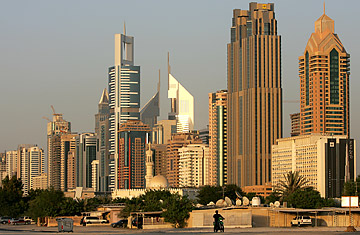
Dubai, United Arab Emirates.
Despite persistent rumors that Dubai's bubble is about to burst, the tiny Arab sheikhdom keeps on growing, and real estate prices continue rising. Whatever controversy the announcement that oil-services giant is re-locating its headquarters to Dubai may be generating on Capitol Hill, in the Gulf region it is being seen as validating Dubai's ambitions to become the new frontier of globalization. At High Society Real Estate, Lesar would learn that a one-bedroom apartment in his new hometown will cost anything from $200,000 to $2.9 million. A relatively commonplace property offered by High Society is a $1.4 million, five-bedroom, 7,469-sq.ft. villa in the Dubai Sports City complex. That's if he can get one at any price, because the delivery date for many luxury dwellings is a year or two away. "Things are booming and the boom will continue," says Boutros Boutros, an executive at Dubai's flagship corporation, Emirates Airlines. "No matter how fast we run, Dubai stays ahead of us."
Dubai's pace of development is, indeed, staggering. A few years ago, Emirates announced plans to expand its fleet to 100 planes by 2010. It passed that mark last year, and is set to receive some of the first super jumbo Airbus A-380s. Only a decade ago, Dubai was a relatively sleepy sheikhdom — one of seven that make up the United Arab Emirates — known for being a trading hub due to its ports, rather than the oil output that enriches its neighbor, Abu Dhabi. But the ambitious Sheikh Mohammed, who formally became its ruler in 2006, implemented a vision that combined Dubai's international trade links with a CEO-management style rare in Middle East governance, transforming Dubai into a global business center and tourist destination.
Under the leadership of Sheikh Mo, as locals have dubbed him, Dubai is an oasis of relative modernity, openness, tolerance and safety, smack in the center of a region torn by war and terrorism. Sheikh Mo is building Burj Dubai, which aspires to be the tallest building in the world. The world's largest amusement park and biggest shopping mall are on the way. The sail-shaped Burj al-Arab has been one of the most famous hotels on the planet since it opened seven years ago; it's become such a tourist destination in its own right that it charges about $50 just to go inside to take a look-the suites-only rack-rate accommodation starts at $2,600 a night.
It all feels much more like Las Vegas than Mecca, but Dubai is an unworldly mix of both. The city's music venues and nightclubs host the best of Arab and international entertainers, while bikini-clad Europeans and local women wearing traditional head coverings can be spotted on the beaches. Dubai hosts major international sporting events, including the world's richest horse race.
Dubai is the Middle East's capital of quirkiness, with its man-made islands constructed as luxury housing estates visible from space in the form of palm trees and a map of the globe. Local recreation includes camel trekking in the desert, snorkeling in the Gulf or skiing down indoor slopes. Becoming an international metropolis also has its down side: Besides the soaring real estate prices and inflation estimated at 20%, other undesirable features of life in the new Dubai include massive daily traffic jams, a rise in prostitution, and growing discontent among the legions of mostly Asian laborers imported for the construction industry.
Halliburton is merely the latest in a growing number of banks and other global service companies making Dubai their Middle East hub. At present, oil provides only 3% of Dubai's GDP, with services accounting for three-quarters. As Sheikh Mo noted when he unveiled his government's new Strategic Plan last month, Dubai has no intention of slowing down. The Ruler vowed to pursue 11% annual growth through 2015 to realize Gross Domestic Product of $108 billion and an average personal income of $44,000 a year. That's pretty big talkin', even by Texas standards.
